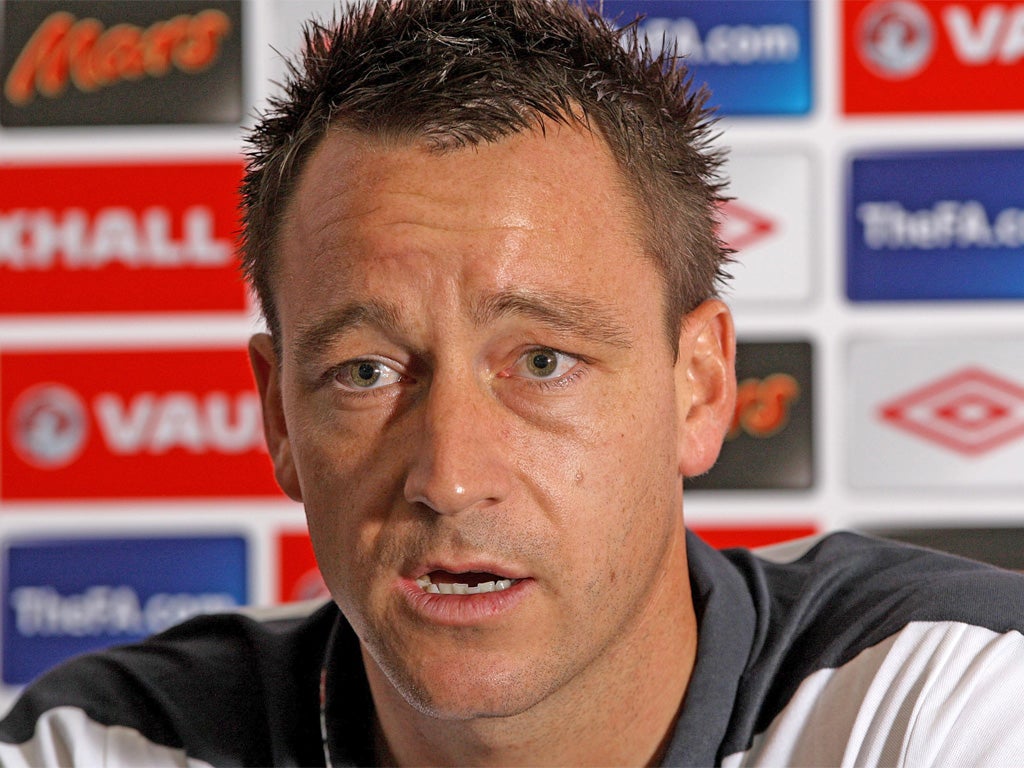John Terry's Teflon reputation is on the line if row continues to grow

Your support helps us to tell the story
From reproductive rights to climate change to Big Tech, The Independent is on the ground when the story is developing. Whether it's investigating the financials of Elon Musk's pro-Trump PAC or producing our latest documentary, 'The A Word', which shines a light on the American women fighting for reproductive rights, we know how important it is to parse out the facts from the messaging.
At such a critical moment in US history, we need reporters on the ground. Your donation allows us to keep sending journalists to speak to both sides of the story.
The Independent is trusted by Americans across the entire political spectrum. And unlike many other quality news outlets, we choose not to lock Americans out of our reporting and analysis with paywalls. We believe quality journalism should be available to everyone, paid for by those who can afford it.
Your support makes all the difference.There is an element of Teflon about John Terry. His misdemeanours off the pitch, from the reported disrespect for the victims of 9/11, through the allegations of financial impropriety to the allegations of marital infidelity, would have claimed the personal and professional lives of lesser men. With Terry, nothing has ever quite stuck.
Judging by his comments yesterday, his Chelsea manager, Andre Villas-Boas, would attribute that to the fact that Terry remains a natural leader for his country, a fine "representative" for the nation, if not a paragon of its virtues. His heart on his sleeve, Terry's lionhearted courage and evident patriotic pride allow him to rehabilitate and redeem himself every time.
Should the Football Association's official enquiry into a complaint of racial abuse, allegedly directed by the 30-year-old towards Anton Ferdinand during Chelsea's foul-tempered 1-0 defeat to Queen's Park Rangers on Sunday, find the England captain worthy of reprimand, that pattern will change.
In his initial, clumsily phrased statement denying the accusation, Terry made much of the fact that the club – and by extension, country – sides he captains are racially diverse entities. If he is charged, if he is found guilty, he will be hanged by the logic of his own defence.
Terry could not be adjudged a suitable representative of his nation if he is deemed to have committed an offence serious enough for the Metropolitan Police to be "assessing" whether to launch a full investigation into a complaint of racial abuse.
It is difficult to imagine the FA permitting him to retain the captaincy of the national side, an honour he has already been deprived of once, should its own investigation result in a guilty verdict. Even Chelsea, such a bastion of loyalty to Terry throughout a career as chequered off the field as it has been gilded on it, would have to consider their position carefully.
After all, this is an offence which comes during the three weeks of the "One Game, One Community" campaign run by the Kick It Out campaign, a group dedicated to ridding football of racism. If the timing seems unfortunate, privately they might even acknowledge that it has helped highlight their cause. Just two weeks after Manchester United's Patrice Evra accused Liverpool's Luis Suarez of racially abusing him a dozen times during the two sides' fixture at Anfield, the England captain stands accused. This is a battle often thought won. There is clearly still a war to be fought.
"Incidents of racial abuse between fellow professionals are very rare," says Brendon Batson, the man behind the Show Racism the Red Card campaign and a man who has done more than most to rid the game of racial abuse. "There is a level of professional respect that ensures that. The focus of most campaigns has always been on fans, rather than players."
The experience of Jason Roberts suggests, though, that such an approach may have been flawed. "Is it something that used to happen all the time? Absolutely," the Blackburn striker said. "In my 14-year career, I've had it numerous times. More times than I can count. It has certainly slowed down recently but the battle isn't won. People still need educating."
That is not to suggest there has been no progress. "I do not want to comment on specific situations, but what this shows is that there are mechanisms there for those who feel aggrieved by abuse to complain," says Batson. "They did not used to be there. Now, if you feel you have been racially abused, you can ensure there are consequences."
By lodging a complaint with the Football Association yesterday, QPR have done just that. There could have been no more high-profile test case for how strong those mechanisms are. The England captain, a man described by his own manager as a "representative" of his nation. If he is found guilty, Terry's Teflon days will be over.
Join our commenting forum
Join thought-provoking conversations, follow other Independent readers and see their replies
Comments